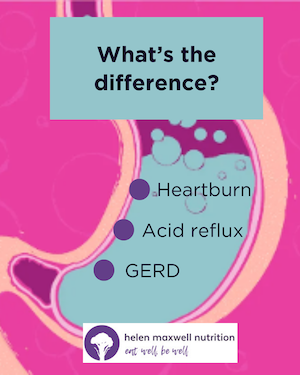
All of these conditions occur when acid from the stomach escapes into your oesophagus, via the sphincter at the top of the stomach, creating a burning sensation.
All of these painful digestive conditions are related and tend to cause similar symptoms, however, they usually develop in stages.
In the case of acid reflux, stomach acid leaks out of the stomach and into the oesophagus. When this progresses, it can be diagnosed as gastroesophageal reflux disease (GERD) which is considered to be more severe. Heartburn is also commonly called GERD.
The most common symptom of GERD is frequent pains in the chest and burning sensations hence the name “heartburn”. Other signs of GERD are difficulty swallowing or keeping down food and liquids, coughing, wheezing and chest pain. Often these symptoms occur or are much worse at night.
An alarming finding from one study conducted in Norway found that the incidence of acid reflux rose from around 11 percent of the population to over 17 percent over a period of 11 years. A similar rise is happening in other industrialised countries too.
It might not be the biggest deal to have acid reflux symptoms on occasion but research shows that people with long-standing, chronic heartburn are at greater risk for serious complications. These include stricture (narrowing) of the oesophagus and inflammation of the oesophagus or oesophagitis. Other developments can include chronic infections and there are concerns re fracture risk and pneumonia (linked to PPI medication).
If we have low stomach acid our food isn’t broken down as quickly or completely so proteins stay in the stomach longer than is normal. This means the acid also stays longer and this can cause digestive issues, especially when we start moving around following a meal. Slowing our digestion down is also a problem as it gives food time to ferment and putrification can occur. This means bacterial balance can become problematic as certain undesirable species thrive (pathogenic) and yeast and fungus can also start to proliferate. This in turn can lead to more serious problems from an unhealthy microbiome balance and conditions such as IBS and multiple digestive issues.
So we need our stomach acid but we need it in the right place.




